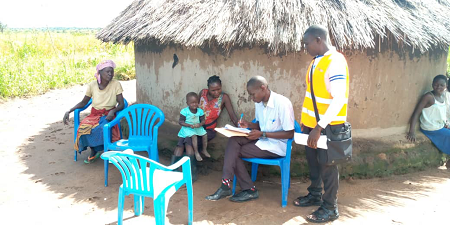New Research Findings in Women’s Land and Home Project

The second phase of HLRN’s Assessing the Impacts of Women’s Dispossession from Land and Home project is well under way, despite challenges posed by the current pandemic. Partner organizations Civic Forum on Housing and Habitat—Zambia and the Zimbabwe People’s Land Rights Movement each held technical training workshops in December 2020, with virtual support from HIC-HLRN in use and application of the Violation Impact Assessment Tool (VIAT). Both organizations are now in the midst of data collection, focusing on their chosen cases of dispossession and the specific impacts on women.
Meanwhile, Shelter and Settlements Alternative: Uganda Human Settlements Network (SSA: UHSNET) has completed research and analysis of its second case study in the Amuru district of Northern Uganda, which was heavily destabilized by the long 20-year-old Lord’s Resistance Army insurgency that afflicted the Acholi Sub-region from the late 1980s to 2006. The survey conducted as part of the research shows that dispossession of female-headed households from their homes was rampant in the area, with 90 percent of female respondents reporting that land-related conflicts were prevalent among them and between different communities.
The study’s findings clearly show that socio-culturally induced gender-based land dispossession has had a significant effect on women/female headed households, highlighting the urgent need to conceptualize the gender dimensions of habitat-related human rights, impacts of land evictions and mechanisms for redress. The study also shows the uncertainty about the exact quantification of cases in the area due to the absence of effective reporting and monitoring mechanisms. SSA: UHSNET has identified three interventions needed (training, dialogue and a transformative socio-cultural campaign) to address the challenge of land and home dispossession of female-headed households at the local level in Amuru, outlined in their upcoming report on this second phase of the project.
In Kenya, Diana Lee-Smith of Mazingira Institute has identified through the project-supported study, conducted with Pamoja Trust and the support of HIC-HLRN, the unique circumstances of women who have faced eviction in their lifetimes. A key finding is that many, even the single and married women interviewed had been evicted more than once due to customary practices. These evictions were all by family members, either the family of birth or the marital family, or both at different times.
Close relatives had forced most respondents to leave their homes of origin because of being female. Respondents had lost their marital homes due to eviction by relatives in their marital family for the same reason. It is seldom that research comes up with a clear new finding, but this small study has done so. It demonstrates how women routinely suffer forced eviction from land and homes through the agency of those closest to them: their families.
Such forced evictions of women and girls, based on them being female, are of a different type from other forced evictions that affect whole communities. They are also mostly violent, frequent, and go unrecorded.
The findings imply that these practices that deny basic human rights are so deeply entrenched that they go unquestioned throughout society, sometimes even by the victims themselves. Even though many respondents experienced emotional distress as they described their housing histories, they usually did not understand these as rights deprivations. They understood them more as loss of their own wellbeing due to customs and social conditions beyond their control. Nevertheless, most went on, when prompted, to suggest that women and men should have equal rights to inherit and own land and housing.
The Assessing the Impacts of Women’s Dispossession from Land and Home project is also reaching new audiences this month, through an International Women’s Day article published in Equal Times celebrating the strength of women in protracted crises, including the crisis of denied inheritance.
See all the outputs of the project here.
Photo: Supervision of data collection process during fieldwork in Amuru. Source: SSA: UHSNet.
|